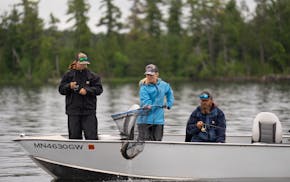Melissa Kenney has spent decades researching how to best convey scientific information to the public.
That expertise has landed Kenney, director of research at the University of Minnesota's Institute on the Environment, on several high-profile projects, including Minnesota's mandatory report on how the state will safeguard clean water for the next 50 years.
Last year, Kenney was asked to contribute to the National Climate Assessment, the nation's foremost report on how climate change is affecting the United States. It would be her third time contributing to the report, which typically comes out every four to five years. The next edition was slated to be released in 2027.
But last week, Kenney received an email from the Trump administration telling her the scope of the report was "being reevaluated" and that her services were no longer required.
"Thank you for your participation in the 6th National Climate Assessment," the email stated. "We are now releasing all current assessment participants from their roles."
Kenney is one of nearly 400 scientists who were dismissed from the report, which Congress mandated under the Global Change Research Act of 1990. Earlier in April, the White House also terminated its contract with ICF International. The global consulting firm provides much of the staffing for the U.S. Global Change Research Program (USGCRP), the federal agency charged with drafting the climate assessments.
The Trump administration has widely targeted climate initiatives in its pledge to slash federal spending. Upon taking office in January, President Donald Trump for the second time pulled the U.S. out of the Paris Climate Agreement, the international treaty to limit global warming to 2 degrees Celsius by the end of the century.
Federal agencies, including the Environmental Protection Agency and the Department of Energy, have frozen tens of billions of dollars in climate-related grants and loans since February. Trump's most recent budget proposal would cut funding for the EPA and the National Science Foundation in half.
Still, the email took Kenney and other National Climate Assessment contributors by surprise.
"I had always been under the naive impression that making those major changes would be hard. Congress is supposed to be the one who's allocating resources," Jay Austin, a physics professor at the University of Minnesota Duluth, told the Minnesota Star Tribune. "I'm missing something, or things are really off the rails."
The White House didn't respond to questions sent by the Minnesota Star Tribune, but said in a statement that "as plans develop for the assessment, there may be future opportunities to contribute or engage."
Austin is one of at least eight Minnesotans who contributed to the Fifth National Climate Assessment, the edition released in 2023.
Climate scientists and advocates say the report is a valuable resource for policymakers and the public. It synthesizes tens of thousands of peer-reviewed studies that document sea-level rise, frequency of extreme weather events, changes in biodiversity and other phenomena. Anyone who reads the Midwest chapter of the Fifth National Assessment would learn that the region has become 5%-15% wetter over the decades, when comparing the most recent 30-year averages, and that states like Minnesota are experiencing warming most notably during the winter.
The USGCRP's funding for fiscal year 2023 amounted to $4 billion, but that doesn't fund the vast majority of the contributors.
"They're zeroing out this … federally mandated project," Austin said. "But the hundreds of scientists that are actually doing the writing and doing the real work are all volunteers."
John Baker, a retired U.S. Department of Agriculture researcher who was coordinating lead author for the assessment's Midwest chapter, said the report benefits numerous constituents, including lawmakers, nonprofit leaders and businesses.
One of the metrics tracked by the assessment is how the nation's floodplains are changing, which Baker said is crucial information for property insurers. In recent years, home insurance premiums have skyrocketed in states like California and Florida as the changing climate increases the frequency and severity of wildfires, floods and other extreme weather.
"Actuaries can only work with past data, so it's a real challenge if you're in a rapidly changing environment and you're seeing increased likelihood of flooding or increased risk of severe thunderstorms," Baker said. Without regularly updated data, "it makes it pretty hard to figure out, 'How do you price insurance?'"
The perils of flooding became obvious last summer in Minnesota. Record rainfall caused a partial failure of the Rapidan Dam near Mankato, destroying a home and nearby business.
Kenney's work on the Fifth Climate Assessment focused on how communities are adapting to climate change. Last year's flooding demonstrates why the report matters, she said.
"We need to be thinking about how we manage dams proactively and put in flood abatement measures, not just for the types of rain events we have already seen but for those that scientists say are possible given a changing climate," she said.
Marissa Ahlering is the science director for the Nature Conservancy's operations in Minnesota, North Dakota and South Dakota and also contributed to the climate report. She said her nonprofit uses the assessment to help plan their conservation and restoration efforts, including how best to engage with landowners whose property might overlap with a project.
"We use it in the Nature Conservancy to help us inform our actions," Ahlering said. "That is one of the goals: to synthesize this information so it can be used by local communities, policy makers — at the state and federal levels."
Kenney said the report also provides useful information for Minnesotans who care about the state's forests. The habitable zone for some species will be pushed farther north as the state's climate warms, meaning some plants that grow in the southern part of the state may not in the future.
"If we want robust forest systems that are climate adaptive, we actually have to be thinking about that now, what the seed banks should be, where they should go, where it makes sense," she said.
After last week's dismissals, it's unclear what will come of the next climate assessment, Baker said, adding that he was "extremely disappointed" to see so many scientists, many of them at the top of their fields, taken off the project. "It really is an apolitical process," he said. "The whole reason it was mandated in the first place was to inform policymakers."
Austin said he "would not want to be a young scientist graduating into this environment."
Kenney said that whatever happens, she hopes the next assessment is as robust as the previous ones, which undergo multiple reviews, including by federal agencies, as well as a lengthy public comment period.
"The reason why we know that the previous assessments are rigorous is because we had hundreds of scientists who have the expertise to evaluate tens of thousands of research papers in a very short period of time," she said.
Klobuchar wants to extend tax credit for plant-based jet fuel, but environmentalists say the climate could suffer

Why now might be the best time to make a deal on boats, ATVs and other powersports
Lupine is starting to bloom in Minnesota. Here's where to find it.

Xcel lets loose a small army of hungry sheep to keep its solar farm in order

